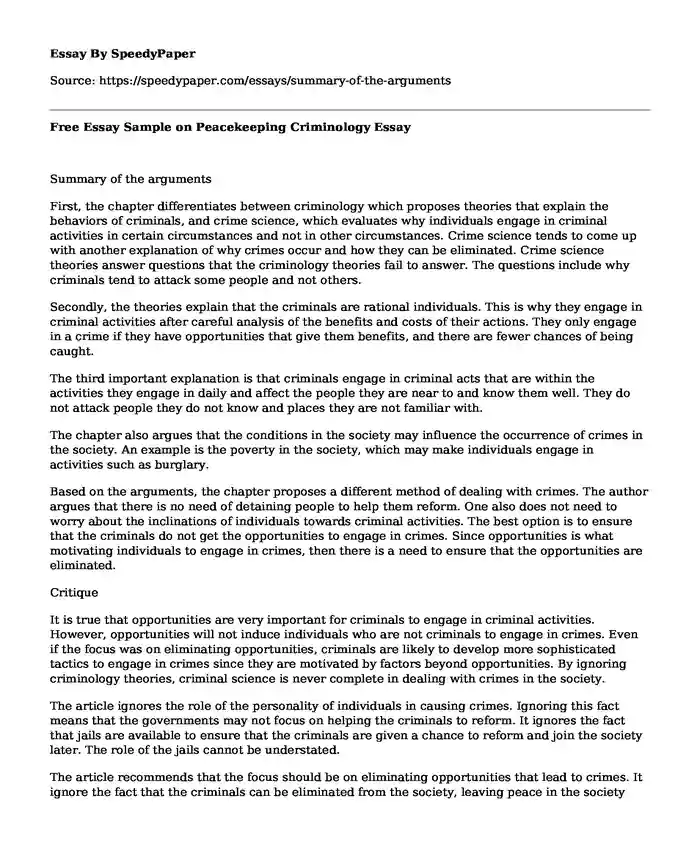
| Type of paper: | Essay |
| Categories: | Criminal law |
| Pages: | 3 |
| Wordcount: | 797 words |
Summary of the arguments
First, the chapter differentiates between criminology which proposes theories that explain the behaviors of criminals, and crime science, which evaluates why individuals engage in criminal activities in certain circumstances and not in other circumstances. Crime science tends to come up with another explanation of why crimes occur and how they can be eliminated. Crime science theories answer questions that the criminology theories fail to answer. The questions include why criminals tend to attack some people and not others.
Secondly, the theories explain that the criminals are rational individuals. This is why they engage in criminal activities after careful analysis of the benefits and costs of their actions. They only engage in a crime if they have opportunities that give them benefits, and there are fewer chances of being caught.
The third important explanation is that criminals engage in criminal acts that are within the activities they engage in daily and affect the people they are near to and know them well. They do not attack people they do not know and places they are not familiar with.
The chapter also argues that the conditions in the society may influence the occurrence of crimes in the society. An example is the poverty in the society, which may make individuals engage in activities such as burglary.
Based on the arguments, the chapter proposes a different method of dealing with crimes. The author argues that there is no need of detaining people to help them reform. One also does not need to worry about the inclinations of individuals towards criminal activities. The best option is to ensure that the criminals do not get the opportunities to engage in crimes. Since opportunities is what motivating individuals to engage in crimes, then there is a need to ensure that the opportunities are eliminated.
Critique
It is true that opportunities are very important for criminals to engage in criminal activities. However, opportunities will not induce individuals who are not criminals to engage in crimes. Even if the focus was on eliminating opportunities, criminals are likely to develop more sophisticated tactics to engage in crimes since they are motivated by factors beyond opportunities. By ignoring criminology theories, criminal science is never complete in dealing with crimes in the society.
The article ignores the role of the personality of individuals in causing crimes. Ignoring this fact means that the governments may not focus on helping the criminals to reform. It ignores the fact that jails are available to ensure that the criminals are given a chance to reform and join the society later. The role of the jails cannot be understated.
The article recommends that the focus should be on eliminating opportunities that lead to crimes. It ignore the fact that the criminals can be eliminated from the society, leaving peace in the society regardless of the opportunities that people may have to commit crimes. Jailing the individuals who commit crimes is a way of ensuring that people with good behaviour remain in the society hence no crimes is committed.
The article does not recommend various ways of eliminating opportunities for the criminals. It does not also recommend a way of making crimes irrational in the society. This is possible through increasing patrols in the society and at the same time, the fines imposed for various crimes should be very high. It would be irrational for a criminal to commit a crime in such a situation.
Question
The chapter does not answer the question: How can opportunities to committing crimes are eliminated.
Opportunities can be reduced through having more security agents on the streets where crimes are common. Individuals can also eliminate the opportunities by ensuring that they do not live or pass through areas where criminals are common.
Assumptions
Peacekeeping criminology seeks to achieve a win-win situation between state and criminals. Criminology seeks to ensure that the criminals and state work together so as to achieve peace in the society.
Peacekeeping criminology assumes that commonsense can help eliminate crimes. This means that having a conflict between state and criminals does not lead to peace. The theory proposes that information be used to change the criminals and make them become peaceful individuals.
The theory assumes that both criminals and society are the cause of crimes. Society shapes the criminals who later engage in crimes. This is why victims and criminals should work together to eliminate crimes.
Courts are not the best way to deal with crimes. Restorative justice is proposed by the theory as a way of bringing peace between people hence facilitating the end of criminal activities.
The theory assumes that the criminals are likely to cooperate in achieving peace. In some instances, individuals may have other motivations apart from achieving material gain as they engage in criminal activities.
Cite this page
Free Essay Sample on Peacekeeping Criminology. (2020, Nov 26). Retrieved from https://speedypaper.net/essays/summary-of-the-arguments
Request Removal
If you are the original author of this essay and no longer wish to have it published on the SpeedyPaper website, please click below to request its removal:
- Free Essay on the Dabbawala Supply Chain Model
- Essay Example on Environmental Management System
- Free Esay Sample on Curriculum
- Essay Example: Barriers to Employment Opportunities in Baltimore
- Multi-Core Processors - Free Essay on Technology
- Genre Reflective Essay
- Essay Example: Authorized Access to Under the "Security Testing" Exception to Copyright Law
Popular categories




